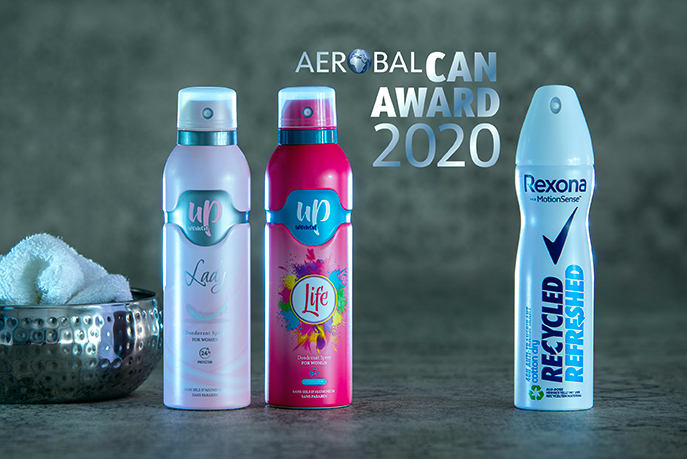
AEROBAL, the International Organisation of Aluminium Aerosol Container Manufacturers, organised its globally acclaimed competition for the best aluminium aerosol cans once again this year. According to AEROBAL’s secretary general, Gregor Spengler, the World Aluminium Aerosol Can Award has long since established itself as a reliable trend barometer for future developments in the international aerosol can market. At the same time, the competition demonstrates impressively the capability and innovative strength of the industry in general and AEROBAL’s member companies in particular. Well-known trade journalists from leading packaging magazines and other specialist media from around the world formed an independent jury once again this year.
The jury awarded the World Aluminium Aerosol Can Award 2020 to cans produced by ARYUM, which the Turkish manufacturer had designed and produced for a client from Tunisia. The client had been playing an important role in the Tunisian perfume market for some time and now wanted to launch its own deodorant brand. ARYUM was asked to develop a distinctive and appealing design for the 200-ml cans for an exclusive deodorant line comprising four different fragrances. The result is truly impressive.
An innovative 360° embossing technique combined with an oriented printing technology is used to create the cans’ unique shape and look and gives them the desired unique character as soon as one sees them. Not only does the special 360° technology produce the impressive all-round shape, it is also possible to achieve 360° printing of the can in an impressive quality. As a result, the cans for the Up deodorant spray for women sometimes appear in vibrant, powerful and almost exploding colours, and sometimes they appear elegant, with finely coordinated shades with filigree patterns and gradations. The design always looks perfect, though. The logo is located in an exposed position on the flatter surface of the can, which shows it off particularly well. There is perfect interaction between the 360° printing and the embossing technique and this creates the desired unmistakable brand image. But the 360° technology goes further than merely positioning the brand in a uniquely visual way: shaping the can around its complete circumference also offers excellent protection against product counterfeiting and brand piracy.
For the first time this year, the international jury also chose a winner in a newly created category: Sustainability. AEROBAL secretary general Spengler explains the reasons behind this move: “Sustainability has long been a convincing argument when it comes to aluminium aerosol cans. We wanted to send out a clear signal to underscore this yet again, though, and we therefore created the new Sustainability category. Our industry is not resting on its laurels. Even in difficult times like these, it is investing considerable resources, creativity, innovative strength and commitment in developing even more sustainable and future-oriented packaging solutions – often in close cooperation with brand owners.”
The first winner in the AEROBAL competition’s new category was the aluminium aerosol can for the Rexona Recycled Refreshed 24-hour antiperspirant from Unilever. It was produced by the German manufacturer Tubex. At first glance, it looks like a conventional aluminium can, but it offers a whole host of innovative and forward-looking solutions to enhance sustainability.
The can is the result of a continuous optimization of alloys. It was produced using a new, patented alloy and contains 25 per cent real post-consumer recyclate (PCR). Thanks to the new alloy and a barely discernible modification of the can’s shape, the can is now 14 per cent lighter than its predecessor. A powder coating is used to protect the inside of the can. In addition, only part of the can’s internal surface is lacquered, namely 50 per cent. The use of powder coating offers ecological benefits: it avoids CO2 when it is applied inside the can, and any overspray is reused.
Reducing the wall thickness, however, made the can more susceptible to denting during packaging and transport. That is why an innovative and fully automatic packaging technology, so-called ‘layer wide packaging’, was specially developed for this new generation of cans. The cans are now placed on pallets instead of being packed in bundles as was previously the case. Besides better protection of the cans, this new process also brings considerable economic and, above all, ecological benefits. A pallet now accommodates 15 per cent more cans and a truck can carry 15 per cent more pallets. The storage space required is also reduced by 15 per cent. All in all, this is a perfectly sustainable concept that has been well thought out from start to finish.
Contact:
Gregor Spengler
Head of Packaging at Gesamtverband der Aluminiumindustrie e. V. (GDA)
AEROBAL Secretary General







